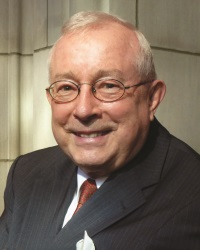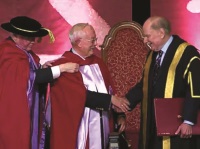With gratitude in your hearts sing psalms, hymns, and spiritual songs to God. (Colossians 3:16)
Musical geniuses are often despondent, incoherent and given to long, painful silences. You would doubtless be shocked to learn that Wayne Riddell is none of these things. He is volcanically cheerful, amazingly articulate and deafeningly heard. Above all, Wayne is fun to be with,” Rev. Dr. James Armour said, reflecting on a 30-year friendship. “A dedicated if somewhat demanding churchman, he is a perfectionist.”
Armour, minister emeritus at the Church of St. Andrew and St. Paul, Montreal, was speaking at a concert celebrating an honorary doctor of music degree conferred on Riddell by McGill University last May.
 Stirred by a remarkable teacher named Juliette Rodrigue in Lachute, Que., Riddell mastered the score of Handel’s Messiah by the age of 10 and, his feet barely reaching the pedals, at 14 became organist at the local United church his family attended. He played piano in the high school dance band and later paid for university playing in a combo at a Lachute bar while earning his degree at McGill’s Schulich School of Music and serving as organist-choirmaster at Westmount Park United Church. Through the ‘60s, he taught in Montreal schools and later at his alma mater, founded the renowned Tudor Singers he led on tours of Canada, the U.S. and Europe. For 16 years from 1972 he was director of music at the Church of St. Andrew and St. Paul, where the choir was the first recipient of a Canada Council prize as the nation’s best. As choirmaster for the Montreal Symphony Orchestra for eight years he occasionally replaced Charles Dutoit on the podium. In 1988, Riddell was named to the Order of Canada for contributions to choral music. Today, as director of music emeritus at A&P, where he became a member in 1982, he remains active as a ruling elder and in many realms of the music he loves.
Stirred by a remarkable teacher named Juliette Rodrigue in Lachute, Que., Riddell mastered the score of Handel’s Messiah by the age of 10 and, his feet barely reaching the pedals, at 14 became organist at the local United church his family attended. He played piano in the high school dance band and later paid for university playing in a combo at a Lachute bar while earning his degree at McGill’s Schulich School of Music and serving as organist-choirmaster at Westmount Park United Church. Through the ‘60s, he taught in Montreal schools and later at his alma mater, founded the renowned Tudor Singers he led on tours of Canada, the U.S. and Europe. For 16 years from 1972 he was director of music at the Church of St. Andrew and St. Paul, where the choir was the first recipient of a Canada Council prize as the nation’s best. As choirmaster for the Montreal Symphony Orchestra for eight years he occasionally replaced Charles Dutoit on the podium. In 1988, Riddell was named to the Order of Canada for contributions to choral music. Today, as director of music emeritus at A&P, where he became a member in 1982, he remains active as a ruling elder and in many realms of the music he loves.
After travelling the world, Riddell lives today on the Lachute street where he was born and recalls his early years with evident pleasure.
“Juliette Rodrigue’s doctor father sent her to Paris Conservatory and she returned to Lachute to teach music. For a country high school, we had a great music program with another exceptional teacher, so I went to McGill far more advanced than many of my colleagues.”
But for all the fun and great times of pop music memory, Riddell’s path toward choral music was firmly set, with religious music always front and centre.
“Music plays an important part in the expression of my faith,” he says. “You’d read in many books that music is a handmaid to worship. It enhances and elaborates the service and can say what words alone cannot, can speak to a different side of your emotions. Of course, I believe that our A&P choir is the best in Canada. There are a couple of churches with professional choirs. We have 24 professional singers which most churches would consider to be the whole choir. We’re lucky to have very high-end volunteers, many students from McGill, so we have 50-plus voices.”
Any advice for churches with less musical talent?
“The person in charge of the music has to make the best of what they have and if they’re at all imaginative, energetic or aggressive, they’ll find music that will work with the singers they have and their abilities. It’s not easy to do.”
He shrugs off suggestions that many church musicians are stuck in the 16th and 17th centuries.
 “There’s a lot of important 20th-and now 21st-century music. Congregations have to be exposed to that. They don’t have to like it but they won’t know if they don’t like it until they hear it. Many 20th-century composers write music I wouldn’t call avant garde but certainly wouldn’t be described as a 16th – century motet. There’s Vaughn Williams, Gustav Holst, so many 20th-century composers.”
“There’s a lot of important 20th-and now 21st-century music. Congregations have to be exposed to that. They don’t have to like it but they won’t know if they don’t like it until they hear it. Many 20th-century composers write music I wouldn’t call avant garde but certainly wouldn’t be described as a 16th – century motet. There’s Vaughn Williams, Gustav Holst, so many 20th-century composers.”
As for those churches that have dabbled with rock quartets in the service?
“I don’t like it, but that’s just me. I can turn on any FM radio station and listen to that any time. For the one hour a week we’d like to be elevated and maybe exposed to something we wouldn’t be otherwise.”
If he was to choose his marooned-on-a-desert-island record, it would be the Bach Mass in B Minor.
And among the memories that might comfort the marooned choral conductor?
“When my Tudor Singers performed the spectacular concert at Lincoln Center, New York, in 1984 and in Europe when we sang in a couple of the big cathedrals like Yorkminster and Worcester in 1981. Those were pretty wonderful experiences.”
Riddell would probably agree with Armour that his life, like the friendship Armour recalled, has been like the La Ronde roller coaster, with lots of ups and downs but, all in all, it has been an exciting ride.
About Keith Randall
Keith Randall is a freelance writer in Montreal.

